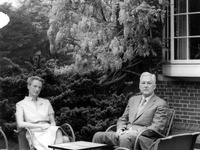Behind his ageless face was a determined leader.
“Pusey was a real university president,” says Harvard historian John T. Bethell. “He had a certain bearing I don’t think you see much anymore.”
Harvard’s first president born west of the Mississippi River—and the first modern Harvard president with previous experience at the helm of an institution of higher learning—Pusey was a devout Episcopalian with strong moral principles.
Pusey was more likely to work behind the scenes to accomplish his goals than to draw attention to himself, but friends and colleagues describe him as noble and uncompromising.
“He’s one of my heroes,” says Fred L. Glimp ’50, who served as Dean of the College and Dean of Admissions under Pusey. “He was not a showboat in any sense.”
Glimp remembers Pusey as a perpetual classicist. Even in the midst of administrative meetings to review potential “flashpoint” issues during the University Hall takeover, Pusey invoked the wisdom of ancient Greek philosophers.
“He reviewed the issues, and then he said, ‘you know what Thucidides would have said about that,’” Glimp said.
And when he spoke with The Crimson last November, Pusey peppered his conversation with classical analogies, describing the Harvard Corporation as the equivalent of the Roman Senate.
Glimp praised Pusey’s dedication to the job, even in the face of harsh criticism after his decision to involve police in the forced removal of students occupying University Hall. “He was never bitter,” he said. “He took a series of tongue lashings that would drive most men crazy, and it never showed up in conversation.”
“He was low-key, but he was very blunt in what he would say,” Glimp said.
Indeed, Pusey was well-known for his resolute outspokenness, both in defending academic freedom and standing by his decision during the University Hall takeover.
Fox praised Pusey’s willingness to “unflinchingly take a leadership role” and his “constancy of character” amidst the turmoil of the times in the final years of his Harvard tenure.
“For someone who went through so much hurly burly,” Fox explains, “his own sense of values was steady as a rock.”
After passing the presidential reins to Bok in 1971, Pusey moved to New York City, working for a variety of non-profit organizations.
He served as president of the Andrew W. Mellon Foundation from 1971 to 1975.
Read more in News
Black Female Alums Celebrate Third Decade













